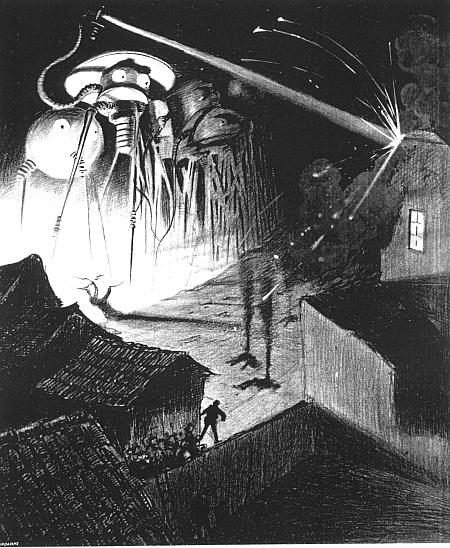- HubPages»
- Books, Literature, and Writing»
- Books & Novels»
- Fiction»
- Science Fiction & Fantasy Books
What's the Point of the Aliens in Sci-Fi?
Why cast an alien?

Colonialism among the stars
The function of the alien
Klingon’s, Vulcan’s, Hutt's, Navi. Space opera just wouldn't be space opera without a few intelligent aliens around. Why do storytellers feel the need to include them? Is their a function that the alien serves that humans would not? Are they just there to highlight the strange setting of the story? It really varies from story to story and sometimes from species to species.
Allegories of colonialism
Many stories from sci-fi's “Golden age,” as well as more recent offerings like Avatar featured humans encountering aliens that are much less technologically developed. This is actually a fairly likely scenario. When you consider the age of the universe related to how short a time humans have been able to even conceive of space travel it's likely that any aliens we meet may be either much more advanced than us or much less advanced. In addition to providing realism these stories provided a lens through which to view the colonialist ideas that dominated world politics prior to WW2. Several authors have been known to take historical events from world history and recast them in science fiction. H. Beam Piper's Uller Uprising's recasting of the Sepoy Mutiny is just one example.
Michio Kaku on alien invasion
The flipside
The other end of the realistic spectrum of aliens, where they are much more advanced is usually occupied with alien invasion stories. From War of the Worlds to “Falling Skies” audiences have an endless appetite for these stories. Usually cast as a David and Goliath story it is (as pointed out by noted Physicist Michio Kaku) more likely to be Bambi vs Godzilla if it actually happened. You might not think these stories have much in common with those that examined colonialism but many are simply the flip side of the coin. An alien invasion looks at what it might be like to be the ones colonized. Sometimes though, when they combine colonialist ideals with advanced weapons potential, they become apocalyptic in nature. Of course an apocalyptic story may be the point of the role reversal. To the American Indians the weapons of the 16th century Europeans may have seemed just as devastating as the alien city killing ships in Independence Day.
War of the Worlds

Terra-forming invasion
Assumptions made for dramatic effect
One thing both of these extremes share is the common assumption that aliens and humans will be comfortable with the same environment. Most aliens are shown breathing the same air at the same concentration of O2 as humans. The alien is usually comfortable with similar gravity, temperature and humidity as well. This certainly provides justification for the idea of invasion and colonialism. Species that have such similar needs will likely compete for the resources to supply them. With resources like asteroid mining to supply artificial habitats one might think that a space-fairing race might not need to bother with planets. However an appropriate planet does offer far more living space for much less effort than any artificial habitat. The only difficulty is how rare they might be. Similar environmental requirements are almost a necessity for allegories of colonialism. Unless one proposes a resource on a less hospitable world that simply cannot be obtained elsewhere there is little reason to colonize, at least without terra-forming. Of course that can be another form of apocalyptic invasion as the War Against the Chtorr series shows.
The human condition
Unrealistic equals
If the realistic aliens are allegories about colonialism what does that make the unrealistic ones? What is the point of an alien race that, for all their differences and stylistic choices, are technologically identical to us? Authors like David Weber have shown you don't need aliens for an interstellar war story (Though Weber does include aliens they are minor players in human conflicts). Consider how many of the aliens are cast. Klingons are a race of warriors. Vulcans dedicated to logic. Hutts a race of gangsters. The arachnids of Starship Troopers a race designed by evolution as the ultimate communists. No one would ever try to describe a human nation in such sweeping generalizations. Some critics accuse the writers who use them of lazy world-building. In some cases the critics may be right but there is another interpretation. In the original “Star Trek” series, debate between the emotional McCoy and the logic driven Spock was a frequent feature. The two characters served to demonstrate within the human condition our need to temper our passions with reason but also moderate logic with compassion. A race composed solely of warriors or gangsters may not make sense when analyzed rationally but it makes a fine means to address extremes of human behavior. A warrior however honorable may be torn between doing what's right and following orders. Those who fight gangsters must guard against becoming as corrupted as those they fight. Many genres tell stories that make these points but science fiction uses aliens as a magnifying lens. Sometimes they provide us a clearer perspective on ourselves than other genre will provide.
A race of warriors

They reflect us
Every portrayal of aliens has to work through a human lens. We are, after all, the only species that we have identified as capable of abstract reasoning. At least as we define the concepts. When it comes to realism this is a problem. A mind that has evolved in an alien environment may have motivations and thought processes quite different from ours. However, realism is seldom the point in telling stories about aliens. These stories are written by humans and for us. They address human characteristics and human needs. Even the most alien of creatures portrayed in science fiction is there either to magnify a human trait or to give the human cause to demonstrate their humanity, or lack their of. Sometimes the alien character may be the most human person in a story.








